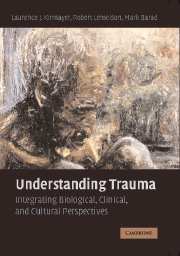Book contents
- Frontmatter
- Contents
- List of Figures
- List of Tables
- List of Contributors
- Foreword by Robert Jay Lifton
- Preface
- List of Abbreviations
- Introduction: Inscribing Trauma in Culture, Brain, and Body
- SECTION I NEUROBIOLOGICAL PERSPECTIVES ON TRAUMA
- SECTION II CLINICAL PERSPECTIVES ON TRAUMA
- SECTION III CULTURAL PERSPECTIVES ON TRAUMA
- 15 Trauma, Adaptation, and Resilience: A Cross-Cultural and Evolutionary Perspective
- 16 Bruno and the Holy Fool: Myth, Mimesis, and the Transmission of Traumatic Memories
- 17 Failures of Imagination: The Refugee's Predicament
- 18 Trauma, Culture, and Myth: Narratives of the Ethiopian Jewish Exodus
- 19 Posttraumatic Politics: Violence, Memory, and Biomedical Discourse in Bali
- 20 Terror and Trauma in the Cambodian Genocide
- 21 Trauma in Context: Integrating Biological, Clinical, and Cultural Perspectives
- Epilogue: Trauma and the Vicissitudes of Interdisciplinary Integration
- Glossary
- Index
- References
21 - Trauma in Context: Integrating Biological, Clinical, and Cultural Perspectives
Published online by Cambridge University Press: 27 July 2009
- Frontmatter
- Contents
- List of Figures
- List of Tables
- List of Contributors
- Foreword by Robert Jay Lifton
- Preface
- List of Abbreviations
- Introduction: Inscribing Trauma in Culture, Brain, and Body
- SECTION I NEUROBIOLOGICAL PERSPECTIVES ON TRAUMA
- SECTION II CLINICAL PERSPECTIVES ON TRAUMA
- SECTION III CULTURAL PERSPECTIVES ON TRAUMA
- 15 Trauma, Adaptation, and Resilience: A Cross-Cultural and Evolutionary Perspective
- 16 Bruno and the Holy Fool: Myth, Mimesis, and the Transmission of Traumatic Memories
- 17 Failures of Imagination: The Refugee's Predicament
- 18 Trauma, Culture, and Myth: Narratives of the Ethiopian Jewish Exodus
- 19 Posttraumatic Politics: Violence, Memory, and Biomedical Discourse in Bali
- 20 Terror and Trauma in the Cambodian Genocide
- 21 Trauma in Context: Integrating Biological, Clinical, and Cultural Perspectives
- Epilogue: Trauma and the Vicissitudes of Interdisciplinary Integration
- Glossary
- Index
- References
Summary
The contributors to this book offer diverse perspectives from which to view trauma and its impacts. In this chapter, we consider how these approaches might work together to deepen our understanding of individual and collective responses to traumatic experience. Our hope is that this will illustrate the value of interdisciplinarity for advancing scientific research, clinical practice, and cultural analysis. We will weave together strands from many of the contributions but begin with a discussion of three further narratives of traumatic experience.
THE DIVERSITY OF TRAUMA RESPONSES
The three case studies we present are drawn from ongoing clinical visual ethnographic research on culture and mental illness in Indonesia by Robert Lemelson (RL). All three individuals suffered trauma during the political upheaval in Indonesia in 1965. All three experienced intense fear or terror witnessing family members being severely beaten, taken away, or killed in front of them. They all have lived in a political climate, from 1965 through the late 1990s, in which their status as relatives of alleged communist party members made them continued targets for harassment, intimidation, violence, and discrimination, often enacted by community members. However, although their exposure to traumatic events was similar in some ways, the long-term outcomes they and their families have experienced are vastly different. These divergent trajectories illustrate the complex interaction of sociocultural, psychological, and neurobiological processes that give rise to individuals' strengths and resiliencies.
- Type
- Chapter
- Information
- Understanding TraumaIntegrating Biological, Clinical, and Cultural Perspectives, pp. 451 - 474Publisher: Cambridge University PressPrint publication year: 2007
References
- 13
- Cited by

